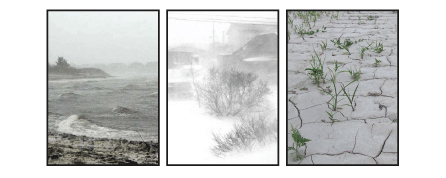 |
 |
 |
 |
 |
 |
| | | | |
|
|
 |
 |
| |
| |
|
|
|
 |
| NJDEP Establishes an Office of Climate and Energy |
|
|
|
| |
|
|
|
There is broad scientific consensus that the earth is experiencing dramatic changes in climate due, in part, to human-caused greenhouse gas emissions. Recognizing the need for immediate and long term action to address this problem, Governor Jon S. Corzine signed New Jersey's Global Warming Response Act on July 6, 2007, directing the state departments to lay out strategies to solve this problem.
|
|
|
|
|
|
|
|
|
| |
|
| |
|
| |
|
|
|
|
On October 24, 2008, former NJDEP Commissioner Lisa P. Jackson announced the formation of a new Office of Climate and Energy in recognition of the high priority that Governor Corzine has placed on combating global climate change. At the same time, former Commissioner Jackson announced the appointment of Dr. Marjorie Kaplan to lead this priority program.
The mission of the Office of Climate and Energy (OCE), which resides within the Office of Policy, Planning and Science, is to coordinate and facilitate Department-wide climate change mitigation and adaption activities. In doing so, the OCE will also work with other State agencies, most notably the Board of Public Utilities (BPU), the Department of Transportation, the Department of Community Affairs and the Department of Agriculture, to develop and implement recommendations designed to achieve the statewide 2020 and 2050 greenhouse gas limits established by New Jersey's Global Warming Response Act.
Specifically, the OCE's primary responsibilities are to:
- Serve as NJDEP's lead on implementing the provisions of the New Jersey Global Warming Response Act and Global Warming Solutions Fund Act;
- Act as the NJDEP's lead to support the development of federal and international initiatives, including federal rulemaking and congressional action;
- Serve as the focal point within the administration for the development and implementation of climate change policies and serve as a facilitator for inter-agency initiatives;
- Develop and implement the NJDEP's climate change policies and programs that are not specifically imbedded in individual NJDEP program areas;
- Coordinate, monitor and assist with the NJDEP climate change policies and programs that are specifically imbedded in individual NJDEP program areas (i.e., air quality, water supply, natural resources); and
- Serve as NJDEP's lead to work with other state agencies to implement the provisions of the Energy Master Plan.
In the five months since its formation, the OCE has released the draft Global Warming Response Act Recommendation Report (available at www.nj.gov/globalwarming/) and held six stakeholder meetings to take comment on the recommendations laid out in the draft report. |
|
|
|
|
| |
|
|
|
|
 |
|
|
|
|
| |
|
|
|
|
The OCE is working with its sister agencies, as well as other programs throughout the Department, to develop specific implementation plans for all of the 2020 supporting recommendations outlined in the draft report, recognizing feedback received at the six stakeholder sessions. Each of these plans will outline action steps and include an implementation schedule. These plans will also include net emissions reductions and estimates of economic impacts.
Other activities of the new OCE include:
- Coordinating New Jersey's participation in the Regional Greenhouse Gas Initiative (RGGI); a ten-state cooperative effort designed to implement a regional mandatory cap-and-trade program in the Northeast and Mid-Atlantic addressing CO2 emissions from Electric Generating Units (i.e., power plants). New Jersey's participation in its first two RGGI auctions, which took place on December 17, 2008 and March 18, 2009, netted the State $32.1 million dollars.
- Proposing and adopting monitoring and reporting requirements sufficient to collect the information needed for the NJDEP to calculate greenhouse gas emissions from electric generating facilities, fossil fuel manufacturers or distributors, natural gas utilities or other significant emitters determined by the NJDEP. This rule proposal appeared in the January 20, 2009 New Jersey Register and a hearing on the proposal was held on March 3, 2009.
- Working through the NJDEP's new Office of Science and the Office of Planning and Sustainable Communities, as well as coordinating with the NJBPU and the NJEDA, to propose and adopt guidelines and a priority ranking system to assist in annually allocating funds to eligible projects or programs using RGGI proceeds.
- Providing ongoing consultation with NJDEP's Forestry Program in developing programs that enhance the stewardship and restoration of the State's forests and tidal marshes that provide opportunities to sequester or reduce greenhouse gases using RGGI proceeds.
- Continuing to coordinate with the NJBPU on the implementation of the State's Energy Master Plan, released in October 2008, including finalization of contracts supporting the development of 1,000 megawatts of large-scale off-shore wind power for New Jersey by 2012.
- Joining the Department of Energy's Midwest Regional Carbon Sequestration Partnership. This will fund a statewide assessment of carbon sequestration potential, including both a geological assessment and a terrestrial assessment. The NJDEP New Jersey Geological Survey will carry out the geological sequestration study.
- Participating in a regional effort to analyze low carbon fuel supply options, with the intent of subsequently designing and implementing a low carbon fuel standard for the Northeast/Mid-Atlantic region, in order to ensure sustainable use of renewable fuels in the region.
Global climate change continues to be one of the most pressing environmental issues of our time. The OCE faces many challenges as it tries to coordinate the internal efforts of the State of New Jersey, and partners with other states and the new federal administration to create a strong national plan of action. |
|
|
|
|
| |
|
|
|
|
|
|
 |
| | | |
|
|
|
 |
 |
 |
 |
 |
|
 |